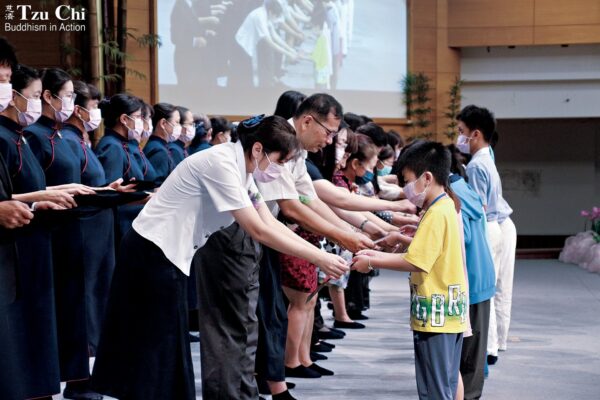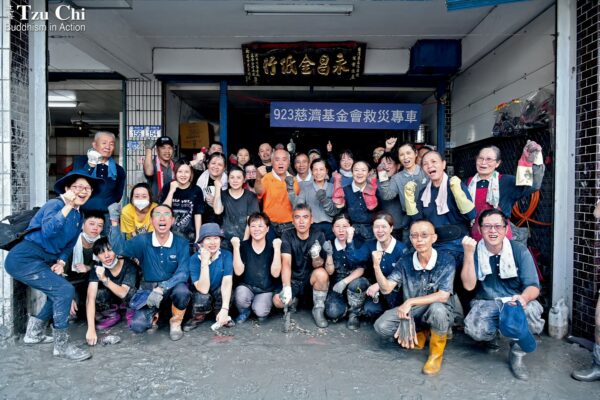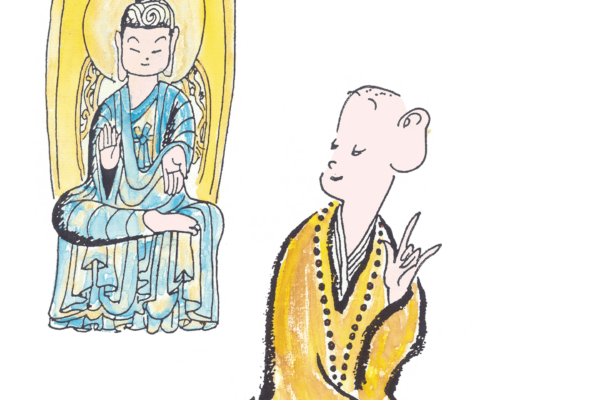By Lin Pei-fei, Yee Siang Yong, Zhang Ru-rong, and Chen Pao-chu
Compiled and translated by Wu Hsiao-ting
Photos by Hsiao Yiu-hwa
Tzu Chi started aiding the West African country of Sierra Leone in 2015 during an outbreak of the Ebola epidemic. In the process of giving help, the foundation learned of more people and communities in need of aid—homeless children, flood-ravaged slums, and communities of amputees and other war-wounded individuals. Tzu Chi is working with three local charitable organizations to bring light into the lives of the underprivileged.
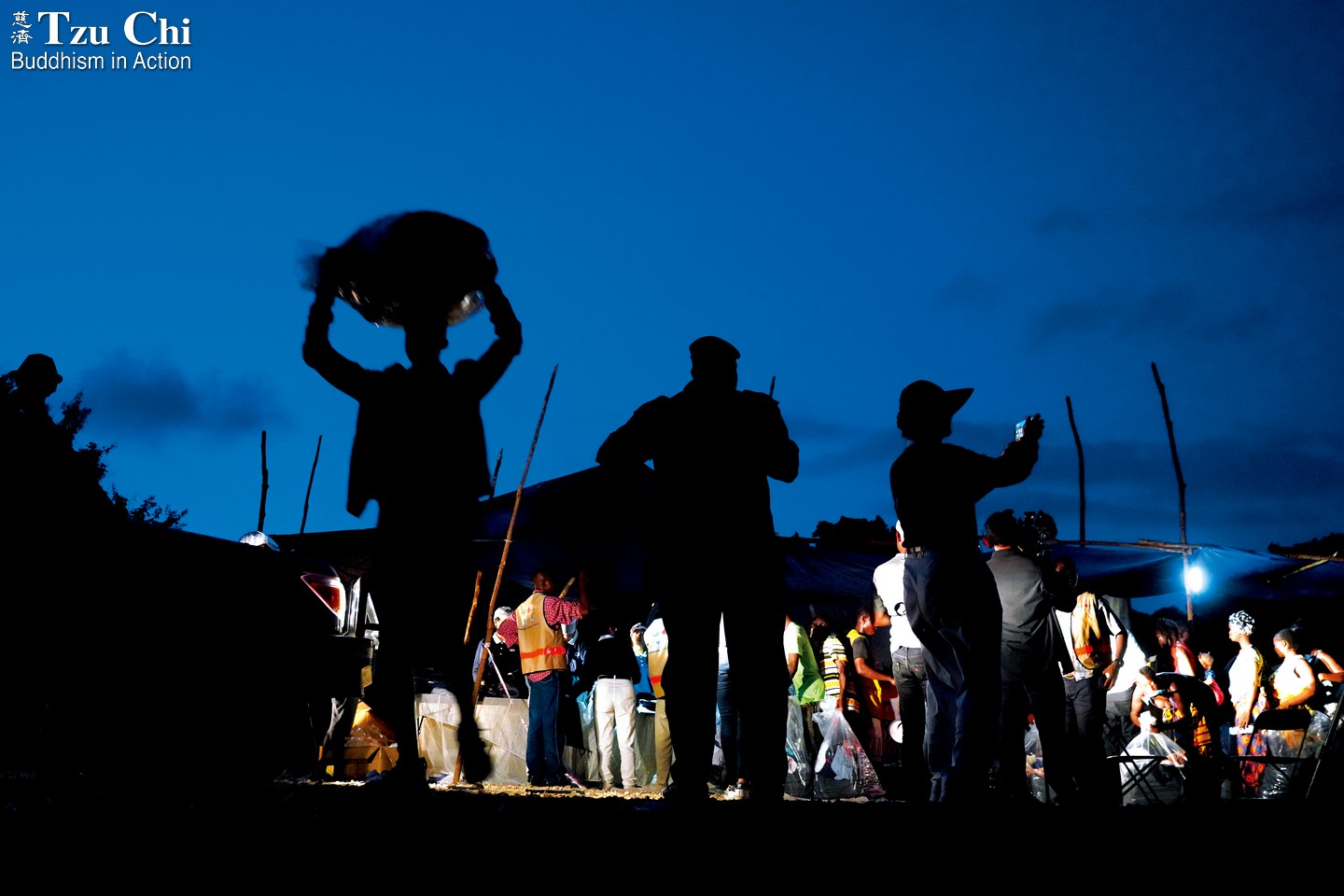
Culvert in Cline Town, Freetown, was one of the areas hit hard by the floods. A Tzu Chi distribution held there on November 14 benefited 500 households. The event started in the afternoon and continued into the night. Some simple lighting was set up, which, coupled with illumination from car headlights, lit up the scene.

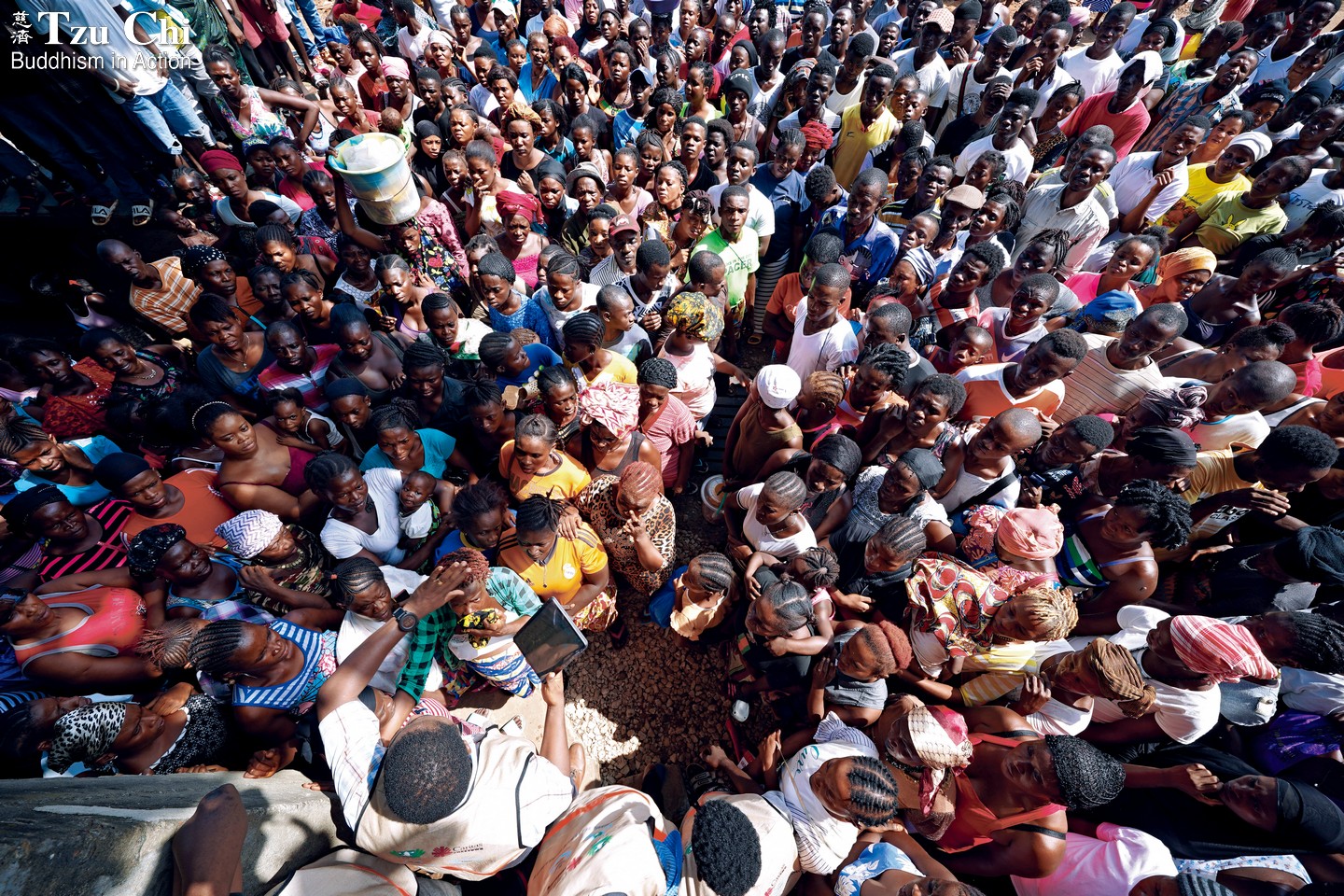
Fight for Survival
Commotion of some sort occurred in almost every distribution Tzu Chi held with its three local partners in Sierra Leone in November 2019. This distribution venue, chock-full of people anxiously waiting to obtain their supplies, reflected how survival is a challenge in a country plagued by poverty, epidemics, and natural disasters. Volunteers did their best to maintain order.
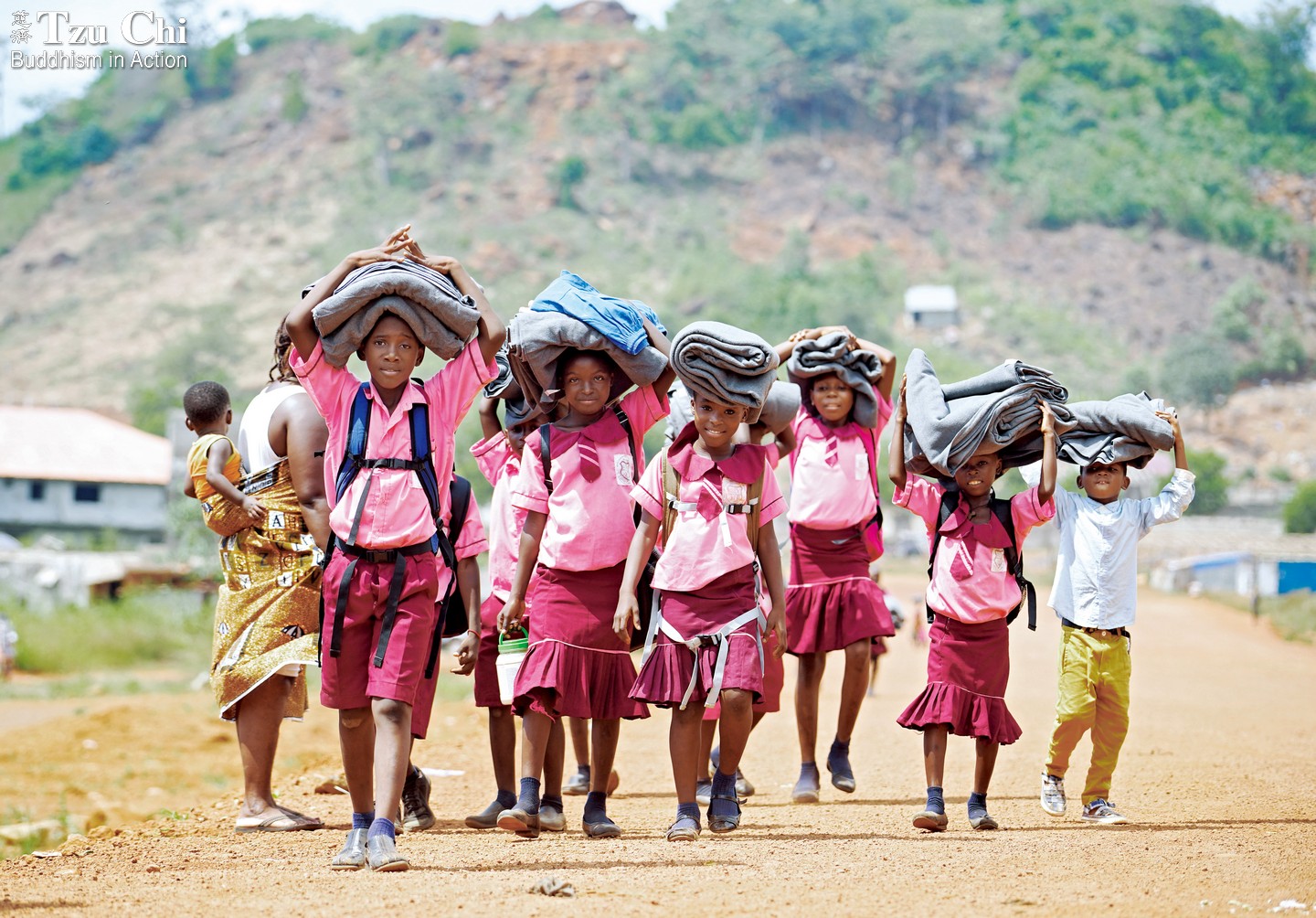
Love for Desert Flowers
Children return home carrying aid items on their heads. Tzu Chi volunteers delivered blankets and multigrain powder to the Kiera Chaplin Desert Flower School, located in a community where most people make a living by quarrying stones. Most families struggle financially, and children often have to skip breakfast. The nutritious multigrain powder Tzu Chi distributed was exactly what the children needed.

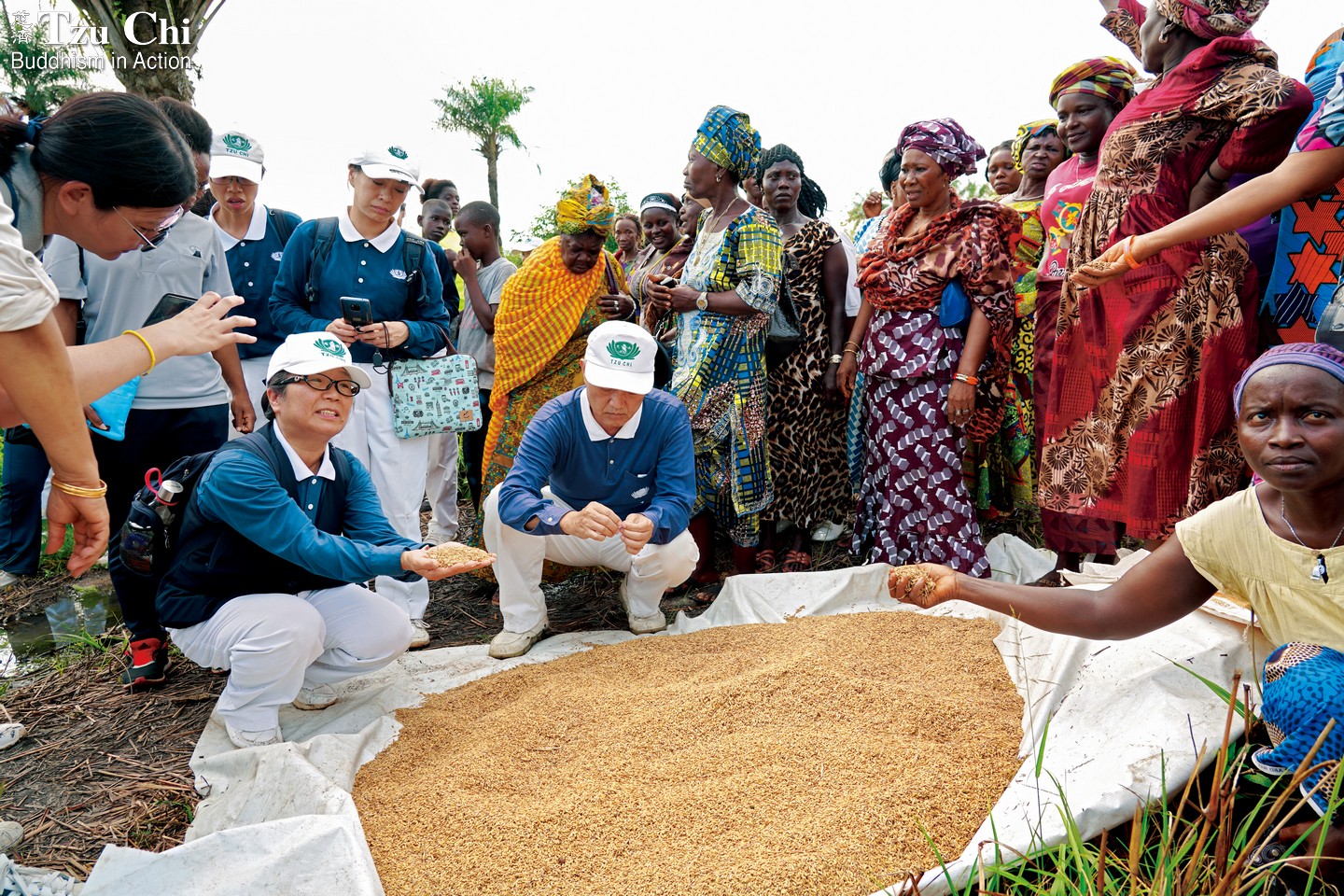
Under the guidance of the Lanyi Foundation and Tzu Chi, women in a community for Ebola survivors grow rice and vegetables to be self-sufficient. They are now able to harvest rice twice a year.
Mention Sierra Leone and most people think of Blood Diamond. That famous movie, released in 2006, was set during the Sierra Leone Civil War. Its title refers to the diamonds mined during the war and sold to fund the armed conflict. The brutal civil war in Sierra Leone lasted over a decade, from 1991 to 2002, and left tens of thousands dead and millions displaced. Even though 17 years have passed since the end of the war, vestiges of the war are still visible today in the villages and on the streets in the nation.
The country has been more recently known for the Ebola epidemic that devastated parts of West Africa from 2014 to 2016. Nearly 4,000 people died and more than 14,000 were infected in Sierra Leone by the time it was declared Ebola-free in March 2016. The epidemic destroyed families, crushed the nation’s weak healthcare system, and devastated an already poor economy. It was also what brought Tzu Chi into the nation.
Tzu Chi started providing long-term aid to people in Sierra Leone in March 2015, in cooperation with Caritas Freetown, the Healey International Relief Foundation, and the Lanyi Foundation. Through these partnerships, Tzu Chi has been able to help survivors of the Ebola epidemic, orphans struggling with hunger, the war-wounded and amputees, health facilities that lack basic supplies, and other underserved people and organizations. Tzu Chi’s work has changed lives for the better in the country.
Tzu Chi’s three partners in Sierra Leone have worked in the nation for a long time. They are like Tzu Chi’s hands and eyes there. It was through them that the foundation learned about the severe floods that hit Freetown, the capital of Sierra Leone, in August 2019. Torrential rains there led to flash floods, submerging houses and forcing people out of their homes. The situation was especially dire for those who lived near the sea or in low-lying regions. They were badly in need of help after having sustained serious losses from the floods.
As soon as they learned of the plight of the flood victims, the Tzu Chi headquarters in Hualien, Taiwan, immediately set out to organize aid for them. Rice provided by Taiwan’s Council of Agriculture, multigrain powder, blankets made from recycled PET bottles, and second-hand clothes collected from across Taiwan were prepared for shipping and distribution. Then, a Tzu Chi delegation consisting of 22 members from the United States, Taiwan, Malaysia, and South Africa flew to Sierra Leone in mid-November to personally deliver into the hands of the needy the much-needed aid supplies. In addition to flood victims, Tzu Chi’s aid also reached Ebola survivors, orphanages, schools, and other institutions. A total of 10,644 people benefited from 18 distributions over nine days. Such an intense distribution schedule was difficult to pull off, but the mission was successful thanks to Tzu Chi’s partners in Sierra Leone.
The first distribution
The first distribution was held in Culvert, a district in Cline Town, Freetown. It had been devastated by the floods. The event was delayed due to several factors, including the limited preparation time, the late arrival of the relief items due to traffic congestion, and the difficulty of confirming household information. The long wait made some of the people in the crowd restless.
The high temperatures, reaching 31 degrees Celsius (87.8 degrees Fahrenheit), made the wait even more of an ordeal. Everyone was sweating, their clothes soaked in perspiration. Dr. Zheng Shun-xian (鄭順賢), an infectious disease specialist from Hualien Tzu Chi Hospital, eastern Taiwan, helped people pass the time by teaching them techniques of good hand hygiene. He taught the crowd the correct way to wash their hands using a simple mnemonic and a step-by-step demonstration. Practicing good hand hygiene is a simple but effective way to prevent infections and the spread of disease. The doctor used exaggerated gestures and movements for his demonstration, thus making it fun and engaging.
Dr. Zheng and his colleague Dr. Chen Pao-chu (陳寶珠), an OB/GYN physician, had joined the mission to Sierra Leone to promote hygiene among the locals. They had even prepared PowerPoint slides for their presentation. However, it turned out that the slides they had prepared were useless—wherever they went there was neither electricity nor projectors for them to show their slides. Due to the language barrier and with no visual aids, they were stumped as to how to convey the health information they needed to share. Thankfully, it occurred to them they could help protect local people from diseases by teaching them to wash their hands.
The atmosphere at the event became livelier when some local women invited Dr. Chen to dance with them. Everyone had a good time. Music and dance are indeed wonderful channels to release people’s emotions and set their souls free.
Since there was no electricity on site, carrying on the distribution after dark would be difficult, so every member of the Tzu Chi delegation worked hard, hoping to wrap up the distribution before sunset. Even so, many people still hadn’t received their supplies by the time dusk fell. Fortunately, people from the Healey Foundation managed to set up some simple lighting, and some time after seven in the evening all items had finally been distributed. Volunteers breathed sighs of relief as they watched the last recipients return home loaded with aid from Tzu Chi.
People line up for blankets and clothes, which are welcome due to the wide temperature variations between day and night in Sierra Leone.
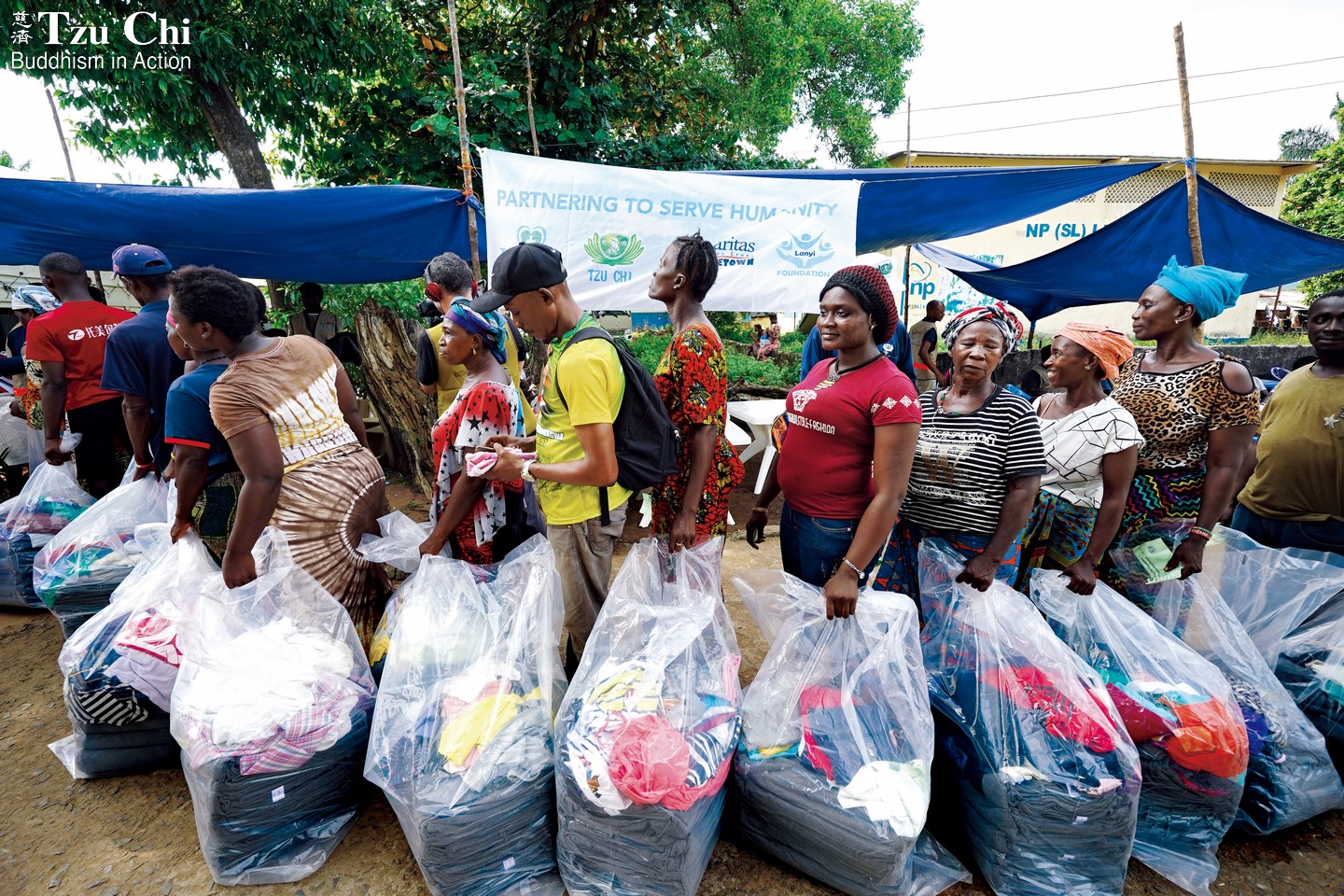
The warmth of their hands
Most of the distributions this time were held in Freetown. The only other place Tzu Chi’s aid reached was Bo District, in Southern Province.
On November 17, the Tzu Chi team set out from Freetown at five in the morning for Bo District, to distribute aid there. They arrived at their destination four hours later.
Philomena Yumkella, CEO of the Lanyi Foundation, was from Bo. She told the volunteers, “I was born and raised here. I started out from here. I know the needs of the people here, and so I came back to help.” The volunteers could tell that the items they distributed were truly appreciated by the recipients. After receiving the blankets, second-hand clothes, and multi-grain powder from Tzu Chi, the villagers cheerfully hoisted the items onto their heads and headed home with a bounce in their steps.
One of the team’s stops in Bo was a farm. Yumkella’s mother had provided the land for some local women to grow crops. With smiles brightening their faces, these 30 women sang sonorously to welcome the volunteers, their singing so lovely that everyone was soon moving their bodies to the rhythm, instantly forgetting the fatigue of their long journey.
These female farmers grew rice and vegetables on the farm. They showed off their freshly harvested rice to the visitors, explaining that although they received aid from Tzu Chi, they worked hard to support themselves too. The volunteers were happy that Tzu Chi’s aid had empowered the recipients, given them strength and hope, and inspired them to work hard to make a living. This is probably the best thing humanitarian aid can achieve.
The multigrain powder Tzu Chi has been providing on a long-term basis to local institutions has enriched the diet of many children. The principal of St. Paul’s School for the Blind, himself visually impaired, thanked Tzu Chi for their help. “Our world is dark, but your love brings light to it,” he said to the visiting volunteers. The children at the school couldn’t see the volunteers, but when the volunteers held their hands, the children responded by tightly holding their hands back. Though the language barrier prevented them from talking to each other, the volunteers’ love was transmitted to the children through the warmth of their hands.
The delegation’s last stop was Kalia, a village with 54 households. Forty-eight people there had died of Ebola. This was the first time Tzu Chi volunteers had come to Kalia, and the residents were looking forward to the aid distribution. Volunteers led the villagers in singing the Tzu Chi song, “One Family.” Then volunteer Liu Jing-qiang (劉鏡鏘) encouraged the villagers to hug each other and pay the love from Tzu Chi forward.
The volunteers distributed aid in six places in Bo District before they left for the long trip home. It was midnight by the time they returned to their hotel in Freetown, bringing to an end a nearly 20-hour stretch to serve those in need.
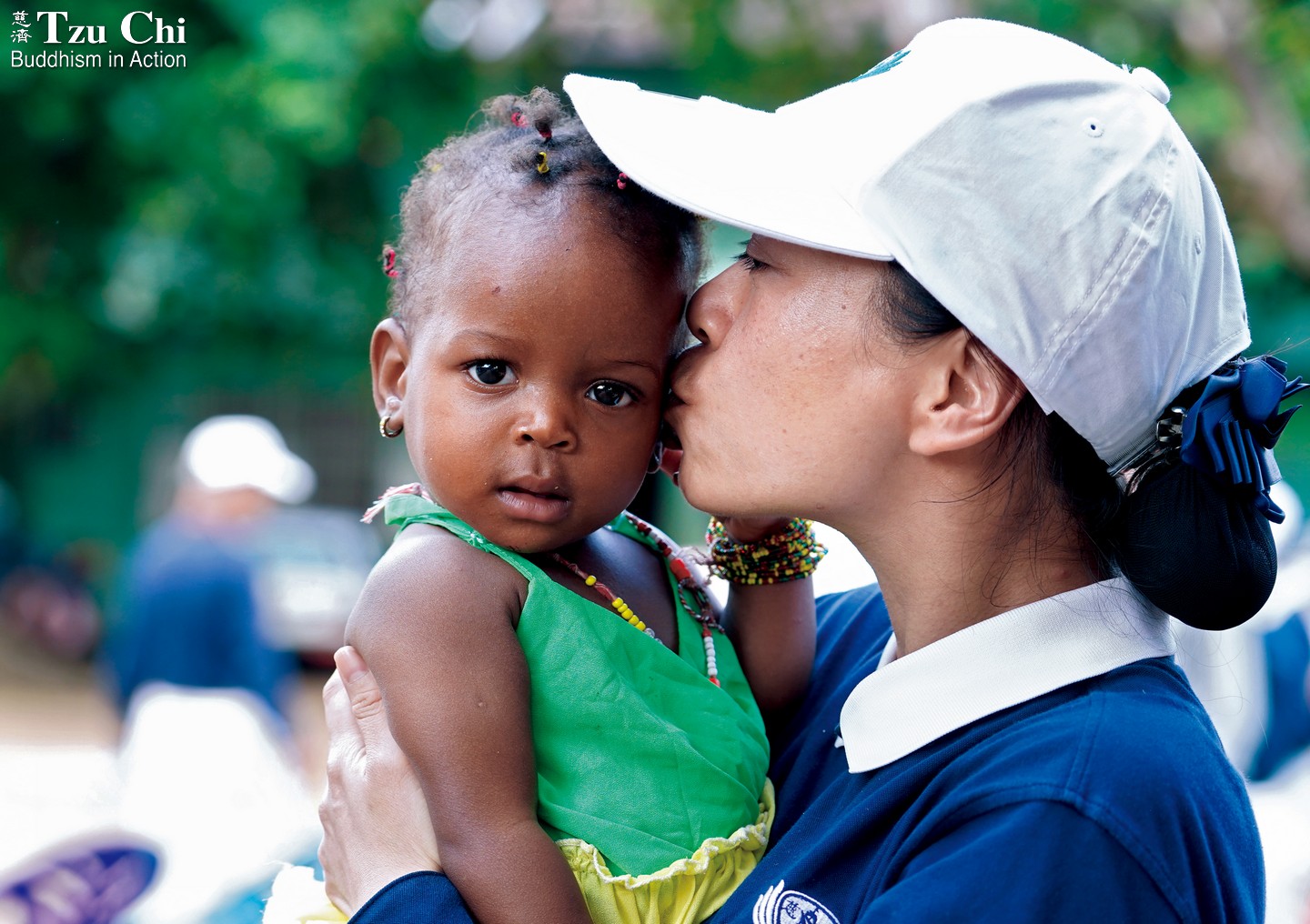
Lin Pei-fei (林裴菲), deputy director of Tzu Chi’s Foreign Affairs Office in Taiwan, kisses a baby girl in Sierra Leone. Children in this African country face all kinds of survival challenges growing up. Lin gave the girl her best wishes.
The light of the world
Caritas Freetown is one of Tzu Chi’s partners in Sierra Leone. On November 19, the delegation visited a school and an orphanage founded by Father Peter Konteh, director of Caritas Freetown.
At the Kiera Chaplin Desert Flower School, the volunteers met first-grader Yatu Koroma. She didn’t know her father, and was being brought up by her mother. She suffered from a congenital issue with her hip, but her family was too poor to afford treatment. She couldn’t walk normally, nor could she stand for a long time. Dragging her weak feet, she “walked” for a kilometer (0.6 mile) every day to school. The trip to and fro was a long journey for someone with her condition.
Koroma was absent from school on the day Tzu Chi volunteers visited. There were goods to receive on this day, and so the school principal wondered why Koroma hadn’t come to school. He hurried to her home to find out why she was absent. Koroma told him that she had had no breakfast that morning, and she was so hungry that she didn’t have the energy to walk to school. Without a moment’s hesitation, the principal picked her up, hoisted her on his back, and carried her to school. Everyone was touched when they heard the story.
Dr. Zheng felt so much compassion for the little girl he decided to help out. He measured the girl’s height and the distance between her elbow and the ground. He would have crutches custom-made for her in Taiwan and then mailed to Sierra Leone.
St. Mary’s-Fatima Interim Care Center is an orphanage that gives shelter to children orphaned by Ebola and natural disasters. After Tzu Chi started providing rice to the institution, the center was able to save up enough money to buy a vehicle to ferry older children to and from school. Due to care from Father Konteh and assistance from Tzu Chi, children at the orphanage have been able to attend school and have a different life.
Tzu Chi volunteers witnessed unimaginable poverty on this trip to Sierra Leone. Food was scarce in many places, and medical care was gravely inadequate. Volunteers visited several medical clinics and found that none of them had doctors—nurses were caring for patients, providing treatment, and even delivering babies. This is a country that will need long-term aid and support.
But amidst that poverty and deprivation, volunteers also witnessed hope and the beauty of humanity. For example, the clergy members and school teachers that the volunteers met exemplified lives of service and compassion. These people lead very poor lives themselves, but still choose to give to those who are more in need. They ask for nothing in return. Their lives of selfless service are truly worthy of admiration and respect, especially in a world where fame, status, and wealth are so much valued and sought after.
The children, teenagers, and adults the volunteers met also demonstrated that happiness is not such a difficult thing to obtain. Despite the little they had, the locals seemed easily satisfied and contented. Perhaps it is because a life of poverty is all that they know, all they have ever seen. And yet, they are entitled to so much more—clean water, a steady supply of food, and a quality education.
Volunteers were impressed that locals had not lost their enthusiasm and passion for life, even though their lives were so destitute. They remembered a school they had visited in which the classrooms were as shabby and crude as could be. The lighting was so poor that the students had to rely on sunlight filtering in through the windows to read and study. To welcome the volunteers, students stood outside their classrooms, singing at the top of their voices: “We are the light of the world, we are the light of the world.”
That brisk melody and their resonant voices made the visitors forget for a moment how run-down the school was, and that the children were either orphans, Ebola survivors, or flood victims. Their smiles conveyed to the visitors their happiness and contentment and made the volunteers feel that, like the lyrics said, these youngsters were indeed the light of the world and the hope of Sierra Leone.
The volunteers hoped that with the help of organizations like Tzu Chi and its partners, these youngsters will grow up properly and, by dint of their own strength, change their lives for the better and bring hope and light to their own country.
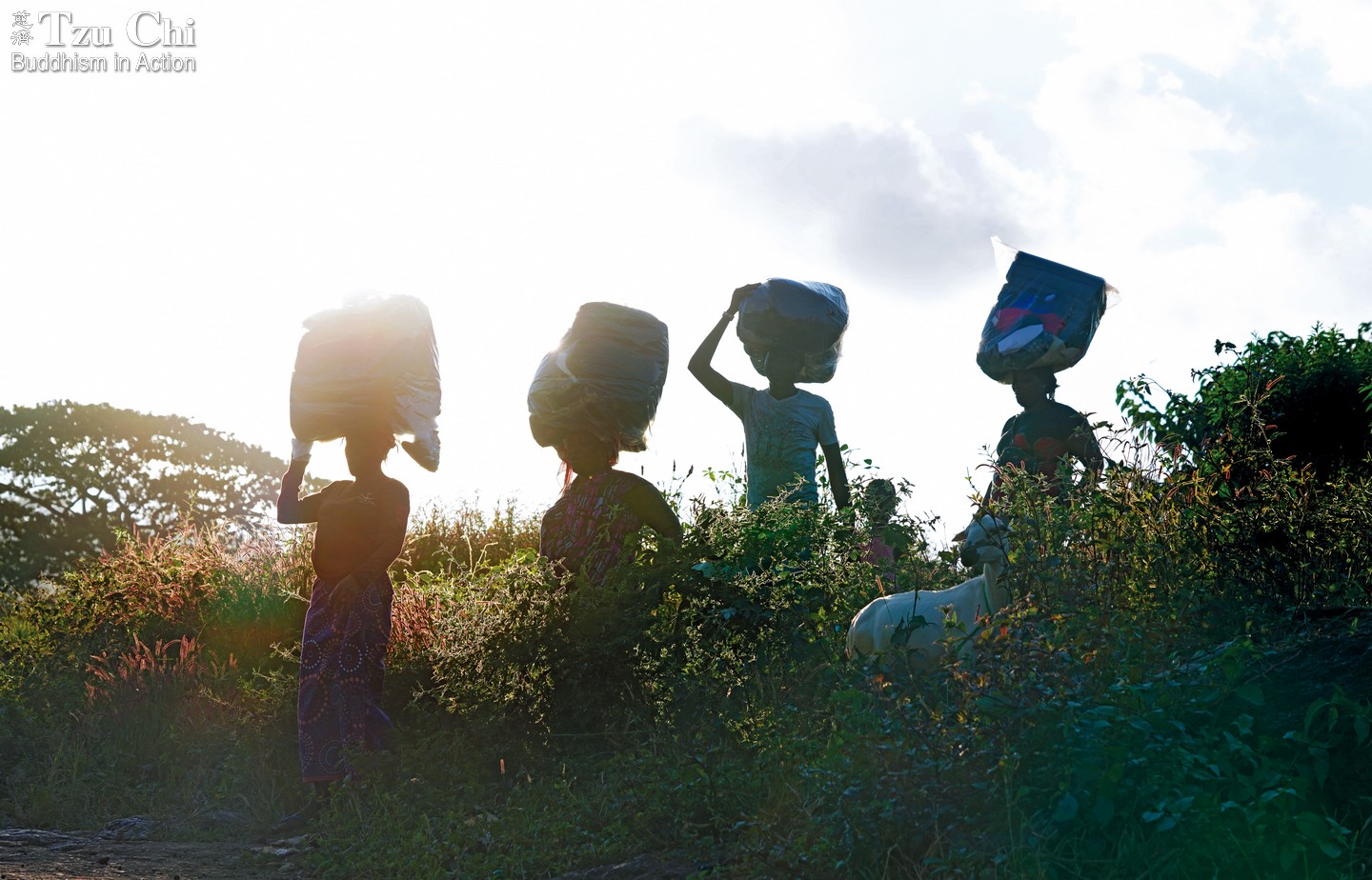
Women take winding mountain paths home. On their heads are items distributed by Tzu Chi.
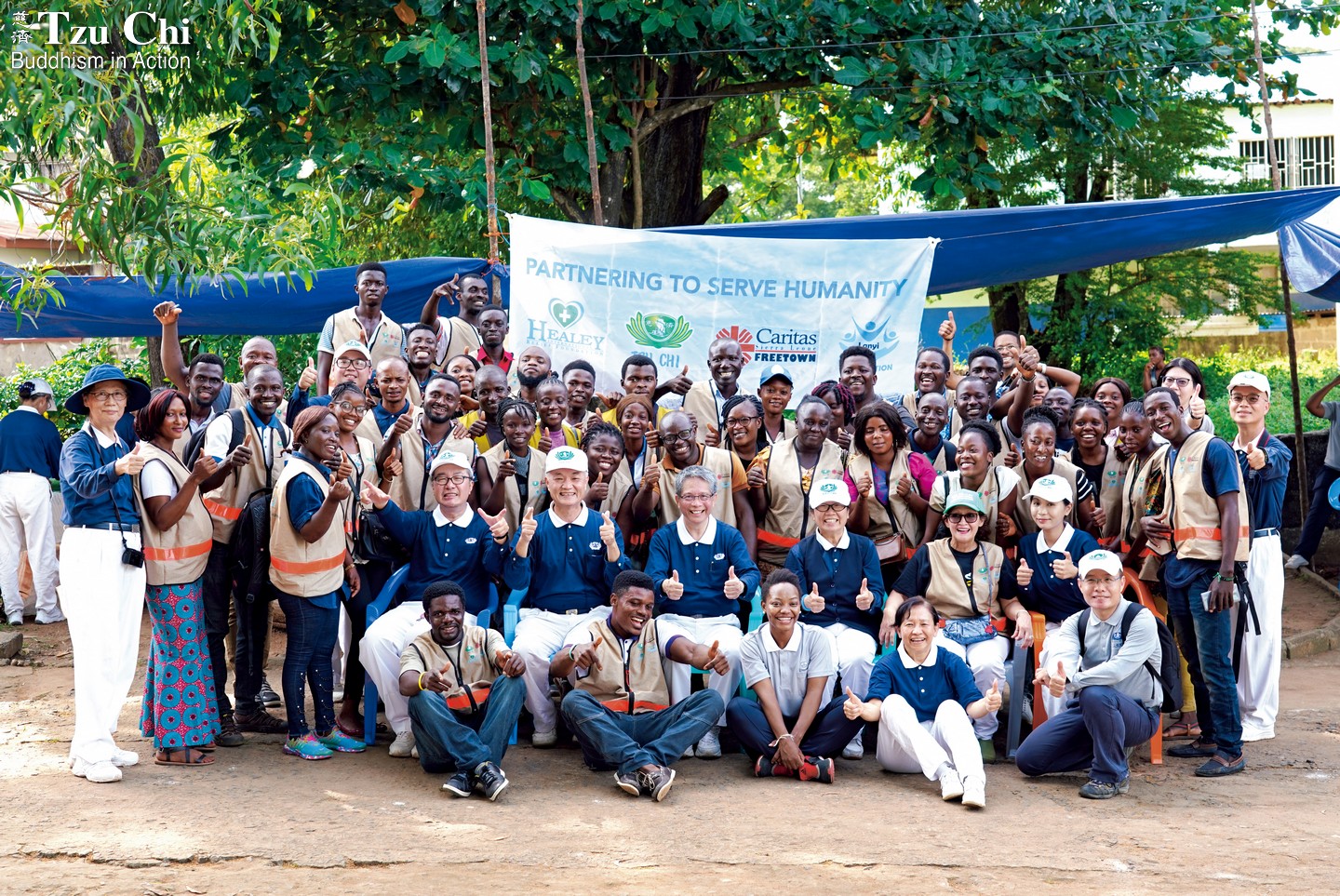
Caritas Freetown, the Healey Foundation, the Lanyi Foundation, and Tzu Chi carried out 18 distributions in communities, welfare organizations, and schools in Sierra Leone in November 2019, providing local underserved people with multigrain powder, rice, blankets, and second-hand clothes.

